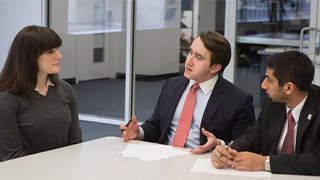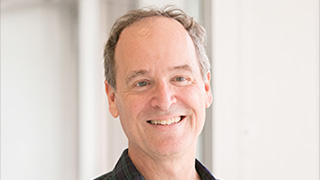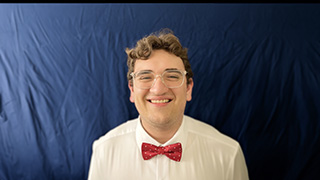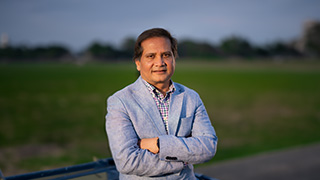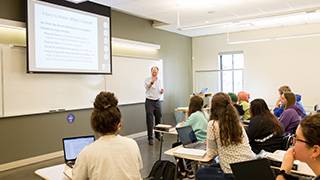Students Reimagine Public Safety with Expert Panel - Seton Hall University
Wednesday, April 26, 2023
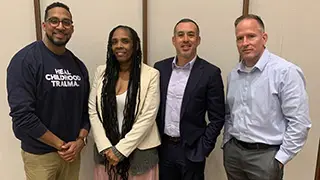
Juan Rios, DSW, Denisah Williamson, Steven Campos, and Thomas Shea, D.Sc.
On April 18, 2023, the Center for Community Research and Engagement's PolicyLab hosted a panel discussion on reimagining public safety, introducing students to the complexities associated with this controversial topic. The law enforcement profession and the criminal justice system have come under increased scrutiny over the last decade, with the criticism reaching an inflection point in 2013 following George Zimmerman's acquittal and subsequent unrest in Ferguson after the 2014 police shooting of Michael Brown. As time progressed, we experienced a cascading effect, hearing countless stories of officer-involved shootings deemed unjustified by the public along with use-of-force practices considered excessive. A central component of this criticism is not only the unjustified use of force, but the disproportionate use of force on people of color, specifically Black men. The advent of social media platforms coupled with the expansion of mobile phone technology has repeatedly thrust these issues into the limelight, sparking outrage throughout the country and leading to calls for major structural changes to our law enforcement agencies.
Technology has proven itself to be a useful tool in exposing racist practices and abusive behaviors by individuals as well as our government institutions, while also drawing attention to policy prescriptions that exacerbate – rather than solve – the problems linked to criminal activity. Unfortunately, technology has also been commandeered by individuals and entities looking to spread misinformation and disinformation, thus creating an environment where it becomes increasingly difficult for each side to share ideas and communicate grievances in a professional manner. To counter the misinformation and disinformation surrounding the reimagining public safety movement, PolicyLab brought four subject matter experts to campus and created a safe space where students engaged in a frank discussion about this sensitive matter.
Students were given a complete overview of the public safety ecosystem, hearing from Thomas Shea, D.Sc., who offered the law enforcement perspective, and Juan Rios, DSW, who offered the social worker perspective. To further augment the conversation, students heard from Steven Campos, Director of the Office of Violence Intervention and Prevention, and Denisah Williamson, MSW, a social worker, Founder and Executive Director of the Newark-based nonprofit organization PUSH, and a local community advocate with 23 years of experience in the civic and social organization industry.
As a multidisciplinary entity, PolicyLab intentionally selected panelists that pushed students to think differently, a strategy welcomed by Rios. "Our discussion taught students the importance of examining policy issues through multiple lenses. When studying complex problems such as crime and public safety, the social worker perspective cannot be overlooked. PolicyLab offers faculty and students the opportunity to work collaboratively, providing a comprehensive understanding of the problem along with realistic solutions," he said.
The conversation covered a variety of points, including the designation of crime as a public health issue, violence intervention and prevention strategies, police culture, and the perceptions of law enforcement in the Black/African American and Brown communities. According to Megan Berg, an undergraduate student majoring in social work, the panelists' willingness to speak openly about their personal experiences made the discussion worthwhile. "I thought the event went really well. I was excited to be a part of it. I found the discussion really valuable because of the panelists – Dr. Shea's comments in particular. His willingness to speak about this issue and his vulnerability while sharing his personal experiences was a critical part of the conversation," Berg said. In a political era plagued by divisiveness, hostility, and hatred, it is incumbent on institutions of higher learning to equip students with the knowledge and skills needed to overcome these barriers and pursue outcomes that further the common good. PolicyLab is leading the way.

